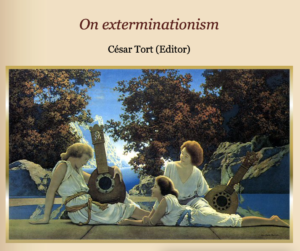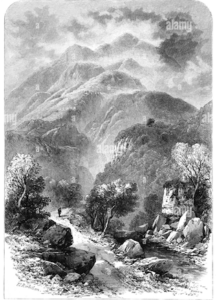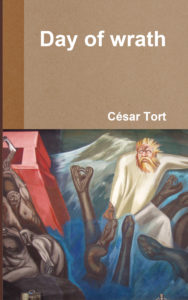Editor’s note: Below is an English translation of one of the articles that originally appeared in the Evropa Soberana webzine, whose Spanish backup we recently uploaded to this site. As it is an article of more than 7,000 words, for those who don’t want to read it all I have put in bold the sentences that I thought are noteworthy.

All things on earth are attained by destruction, for without destruction there can be no generation. —Hermes Trismegistus
The text to be presented here is a selection of Hindu texts, which I have seen on various traditionalist websites. I copied and pasted the texts at the time and now I am rephrasing them and adding a couple of appendices of my own. For the record, the main body of the text is not my own, and I present it for the sake of its great interest.
This article should not be interpreted literally, but taken for what it is: a possibility to learn about the concept of the future held by ancient Indo-European societies, of which Vedic India was the most developed example. Perhaps the most remarkable issue is that, as opposed to the modern notion of ‘progress’ from a past of brutality and underdevelopment, these texts rather speak of a degeneration and a fall of the human being from the state of grace, which would have been reached in the remote past.
The duration of the universe
According to a theory that Shivaite philosophy calls Niyati (determinism), the development of the world, of galaxies, of species or individuals, is regulated by cycles. Civilisations are born and die according to ineluctable rhythms. This is why we can only understand the history of mankind in relation to the duration of the cycles that govern life on Earth. The first stage of creation is that of space, of the container in which the world will be able to develop and which, in its origin, has neither limits nor dimensions. Time does not yet exist except in a latent form which we may call eternity, for there is no measure, no duration, no before and no after. An instant is not in itself longer or shorter than a century if it is not in relation to an element of consciousness which enables its direction to be determined and its duration measured. It is energy, through the production of vibratory waves that have a direction and a length, that will give rise to the rhythms whose perception will create the dimension of time, the measurement of space and at the same time the structures of matter. The time perceived by man corresponds to a purely relative duration concerning a centre of perception (the living being) in the particular world which is the terrestrial world. It is not an absolute value of time. However, human time is the only unit of measurement that is comprehensible to us. It is in relation to it that we can estimate the duration of the Universe which is, from the point of view of the creative principle, no more than a day’s dream or of certain atomic worlds whose duration is but a fraction of time, for us infinitesimal. Duration is different only in relative terms, since there is no value of time except in relation to a particular system of perception.
‘The time of the creative principle, the duration of a day of Brahma that sees the world appear, develop, fold up and disappear, is called a kalpä. His night lasts another kalpä.’—Lingä Purana, 1.4.6.
‘The duration of the material or world of appearances (Prakriti) is called Brahma’s day. An equal period forms the night of Brahma during which the world ceases to exist. It is not really day and night, these terms are used symbolically.’ —Linga Purana, 1.3, 3-6.
During Brahma’s day the cells that make up the universe (the galaxies, the solar systems) are formed, destroyed and renewed, just as the elementary particles that make up the human being are endlessly destroyed and renewed.

The cosmos is basically made up of tiny points of light in which energy and matter are concentrated, floating in a vast, dark ‘sea’ of vacuum or perhaps antimatter. Galaxies are light-generating elements, while black holes are destroyers. Yet, as vast as this whole web is, the ancient Hindus conceived the beginning and end of the universe, speaking of cycles of unfolding and retracting of the cosmos, as if it were breathing. This would not be far from the modern hypothesis of the ‘Big Bang’, a primordial explosion that launched matter in all directions and started the expansion of the universe and the ‘Big Crunch’: gravity eventually overcomes the inertia of the explosion, which is lost, and compresses the entire universe back into a minimum space, which explodes again in another big bang.
Precise calculations of time cycles ranging from a wink (kashta, approximately one-fifth of a second) to the duration of the Universe are given in numerous works, in particular the Puranas.
‘The life of Brahma (or the life of the Universe) is divided into a thousand cycles called Mahâ Yugâ, or Great Year (corresponding in the terrestrial world to the pressure cycles of the equinoxes). The Mahâ Yugâ, during which the human species appears and disappears, is divided into a little more than seventy-one cycles of fourteen manvantaras.’ —Linga Purana, 1.4.7.
Before the appearance of the living species, there first appear the subtle beings who preside over the unfoldment of the various aspects of creation. The forms of consciousness that preside over the organisation of matter are called ‘gods of the elements’ (Vishvädévä). Those who preside over the life of the living species, considered as entities developing in time and of which the individual beings are the cells, are the ‘lords of the species’ (Prajâpati). The beings who preside over the development of knowledge, parallel to that of life, and who are the conscious witnesses of the secret nature of the world, are called the ‘seers’ (Rishi). The Rishi sometimes manifest themselves in human form.
‘During what is called Brahma’s day, everything “evolving” (vikriti), including the gods of the elements (Vishvädévä) and those who preside over the evolution or unfoldment of the species (Prajâpati) as well as the subtle or embodied beings who preside over the unfoldment of knowledge, the witnesses or seers (Rishi) are present. They disappear during the cosmic night and are reborn again at the dawn of day.’ —Linga Purana, 1.4. 1-4.
The cycles of the yuga
Cycles, linked to astronomical periods, determine the life span of species. The duration of a human species is included in a cycle called Manvantara (the period of the reign of a Manu, the progenitor-legislator of the human race). Each of the Manvantara is divided into four ages or Yuga, presenting a gradual decline of spiritual values at the same time as material progress.
‘The relative duration of the four ages is respectively four, three, two and one. Each age is preceded by a period of dawn and followed by a period of twilight. These transitional periods (amsha) at the beginning and end of each age last for one-tenth of the total duration of the age.’ —Linga Purana, 1.4, 3-6.
The four ages are called: Krita Yuga, Treta Yuga, Dvapara Yuga and finally Kali Yuga. They have a respective duration of 24,195, 18,146, 12,097 and 6,048 years.
According to the traditional Hindu calendar still in use, the Kali Yuga begins in 3102 b.c.e. If we accept these dates for the beginning of the Kali Yuga, we get the following calendar:
Dawn of the Krita Yuga: 58,042 b.c.e.
Dawn of the Treta Yuga: 33,848 b.c.e.
Dawn of the Dvapara Yuga: 15,703 b.c.e.
Dawn of the Kali Yuga: 3,606 b.c.e.
Kali Yuga 3.102 b.c.e.[1]
Middle of the Kali Yuga: 582 b.c.e.[2]
Beginning of the Twilight: 1939 c.e.[3]
End of the Twilight of the Kali Yuga: 2442 c.e.[4]
The twilight of the Kali Yuga would therefore have begun in the year 1939 of our era, in May.[5] The final catastrophe will take place during this twilight. The last vestiges of present-day humanity will have disappeared by 2442. From this date and going backwards we find that the first humanity would have begun in the year 419,964 b.c.e., the second in 359,477, the third in 298,990, the fourth in 238,503, the fifth in 178,016, the sixth in 118,529 and the seventh in 58,042.
The first period, the Krita Yuga (‘age of truth’), is the age of realisation and wisdom (corresponding to Hesiod’s golden age). With its dawn and twilight, it lasts 24,194 years.[6]
Next comes the Treta Yuga, i.e. ‘the age of the three ritual fires’, the age of rites and also of the household, i.e. of sedentary, agricultural and urban civilisation. Its duration, with its dawn and twilight, is 18,145 years in all.
The third age, the Dvapara Yuga or ‘age of doubt’, sees the birth of religions and contested philosophies. Man loses his sense of the divine reality of the world and turns away from Natural Law. The Dvapara Yuga lasts 12,097 years.
Finally comes the fourth age or ‘age of conflict’, the Kali Yuga. It lasts 6,048 years. It will result in the almost total destruction of present-day humanity. [what I call ‘the extermination of the Neanderthals’ —Ed.]
The predictions: the precursor signs
The period preceding the cataclysm that is to destroy the present species of humans is marked by the disorders that are heralding signs of its end. As happened in the case of the asuras (the demons in Hinduism), Shiva can only destroy those societies that have strayed from their role, and that have transgressed Natural Law. According to the theory of the cycles that regulate the evolution of the world, we are today approaching the end of the Kali Yuga, the age of conflicts, wars, genocides, embezzlements, aberrant philosophical and social systems and the evil development of knowledge falling into irresponsible hands. Races and castes are mixing. Everything tends to be levelled out in all areas: the prelude of death. At the end of the Kali Yuga this process is accelerated. The phenomenon of acceleration is one of the signs of the approaching catastrophe. The Puranas describe the signs that characterise the last period, the twilight of the Kali Yuga.
According to the Linga Purana:
It is the baser instincts that stimulate the men of the Kali Yuga. They prefer to choose false ideas.They do not hesitate to persecute the wise. Desire torments them.
Neglect, disease, famine and fear, spread. There will be severe droughts. The different regions of the countries will oppose each other.
The sacred books will no longer be respected. Men will have no morals, and will be irritable and sectarian. In the age of Kali false doctrines and misleading writings spread.
People are afraid, for they neglect the rules taught by the sages and no longer perform the rites correctly.
Many will perish. The number of princes and farmers will gradually decrease. The Sudra classes [serf classes, low castes, dark-skinned—Evropa Soberana] want to take over the royal power and share the knowledge, the food and the beds of the old princes. Most of the new chiefs will be of Sudra origin. They will persecute the Brahmins [high caste, light-skinned—Evropa Soberana] and those with wisdom.
Foetuses in their mother’s womb will be killed and heroes murdered.
Sudras will pretend to behave like Brahmins, and Brahmins like Sudras.
Thieves will become kings, kings will become thieves.
Many will be the women who will have relations with several men.
The stability and balance of the four castes of society and the four ages of life will disappear everywhere. The land will produce too much in some places and too little in others.
The rulers will confiscate property and misuse it. They will cease to protect the people.
Vile men who will have acquired a certain knowledge (without having the virtues necessary for its use) will be honoured as wise.
Men who do not possess the virtues of warriors will become kings. There will be wise men who will be in the service of mediocre, vain and spiteful men. Priests will debase themselves by selling the sacraments. There will be many displaced people, wandering from country to country. The number of men will decrease and the number of women will increase.
The animals of prey will become more violent. The number of cows will decrease. Good men will give up their active roles.
Already cooked food will be offered for sale. Holy books will be sold on street corners. Young girls will trade their virginity. The cloud god will be inconsistent with the distribution of rain. Merchants will trade dishonestly. They will be surrounded by pretentious false philosophers. There will be many beggars and unemployed. Everyone will use harsh and rude words. No one can be trusted. People will be envious. No one will want to reciprocate a service received. The degradation of virtues and the censure of hypocritical and moralising puritans will characterise the period of the end of Kali.
There will be no more kings. Wealth and harvests will diminish. Bandit groups will be organised in the cities and the countryside. Water will be scarce and fruits will be in short supply. Those who should ensure the protection of the citizens will not do so. Thieves will be numerous. Rape will be frequent. Many individuals will be perfidious, lubricious, vile and reckless. They will wear their hair in disarray. Many children will be born whose life expectancy will not exceed sixteen years. Adventurers will take on the appearance of monks with shaven heads, orange robes, and rosaries around their necks. Wheat stocks will be stolen. Thieves will steal from thieves. People will become inactive, lethargic and aimless. Diseases, rats and noxious substances will torment them. People afflicted by hunger and fear will take refuge in kaushikä (underground shelters).
Rare will be the people who will live for a hundred years. Sacred texts will be adulterated. The rites will be neglected. Wanderers will be numerous in all countries.
Heretics will oppose the principle of the four castes and the four ages of life. Unqualified people will pass for experts in matters of morality and religion.
People will slaughter women, children and cows, and kill each other.
—Linga Purana, Chapter 40.
According to the Vishnu Purana (Book VI, Chapter 1):
The people of the Kali Yuga will pretend to ignore caste differences and the sacredness of marriage which ensures the continuity of a race, the relationship of teacher to pupil and the importance of rites. During the Kali Yuga people of any origin will marry girls of any race.
Women will become independent and look for beautiful men. They will adorn themselves with extravagant hairstyles and leave a poor husband for a rich man. They will be slim, greedy and attached to pleasure. They will produce too many children but will be little respected. They will be interested only in themselves, they will be selfish and their words will be perfidious and deceitful. Highborn women will indulge in the desires of the vilest men and perform obscene acts.
Men will want nothing more than to make money, the richest will be the ones in power. Those who possess many elephants, horses and chariots (‘possessions’) will be kings. The poor will be their slaves.
The heads of state will no longer protect the people but, through taxation, will appropriate all the wealth. The farmers will abandon their tillage and harvest work to become kârû-karmä (unskilled labourers) and will take on the behaviour of the out-of-caste [the untouchables—Evropa Soberana]. Many will be clothed in rags and without work will sleep on the ground, living as wretches.
Because of the lack of public authorities, many children will die. Some will have white hair by the age of twelve.
In these times the path traced by the sacred texts will disappear. People will believe in illusory theories. There will be no more morals, and the length of life will be shortened.
People will accept as articles of faith the theories promulgated by anyone. False gods will be worshipped in false temples in which fasts, pilgrimages, penances, donation of goods and austerities will be arbitrarily decreed in the name of pretended religions. People of low caste will wear a religious habit and, by their lying behaviour, make themselves respected.
People will take food without washing it. They will venerate neither domestic fire nor guests. They shall not practise funeral rites.
Students will not observe the rules of their state. Established men shall no longer make offerings to the gods or gifts to meritorious persons.
The hermits (vanaprasthä) will eat bourgeois food and the monks (sanyasi) will have loving ties (snéhä-sambandhä) with their friends.
The Sudras will claim equality with the brahmins. The cows will not be saved because they will give milk.
The poor will make the glory of their poverty, and the women of the beauty of their hair.
Water will be scarce and, in many regions, the sky will be watched in hope of a downpour. The rains will be scarce, the fields will become barren and the fruits will have no more taste. Rice will be scarce and goat’s milk will be drunk.
People suffering from drought will feed on bulbs and roots. They will have no joy and no pleasure. Many will commit suicide. Suffering from hunger and misery, sad and desperate, many will emigrate to the countries where wheat and rye grow.
Men of little intelligence, influenced by aberrant theories, will live in error. They will say, ‘What is the use of gods, priests, holy books, ablutions?’
The lineage of the ancestors will no longer be respected. The young husband will go to live with his in-laws. He will say: ‘What is the meaning of a father or a mother? All, according to their deeds, their karma, are born and die’. (Therefore family, clan and race have no meaning.)
In the Kali Yuga men will have no virtue, no purity, no modesty, and will know great misfortunes.
—Vishnu Purana, VI. 1.
According to the Linga Purana (Chapter 40):
During the twilight period when the Yuga ends, the Justiciar will come and slay the wicked.[7] He will be born in the Moon dynasty. His name is Samiti (‘War’). He will roam the earth with a vast army. He will destroy the mlécchä (‘barbarians’, ‘foreigners’) by the thousands. He will destroy the low-caste people who have seized royal power and will exterminate false philosophers, criminals and people of mixed blood. He will begin his campaign in his thirty-second year and continue for twenty more. He will kill billions of people. The earth will be razed to the ground, people will kill each other furiously.
In the end there will be left on one side and the other, groups of people killing each other to rob each other. Agitated and confused, they will abandon their wives and their homes. They will have no education, no law, no shame and no love. They will leave the fields to migrate outside the borders of their country. They will live on wine, meat, roots and fruits and clothe themselves with bark, leaves and animal skins. They will no longer use money. They will be hungry, they will be sick and they will know despair. It is then that some will begin to reflect.
—Linga Purana, Chapter 40.
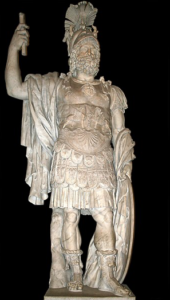
Statue of Mars from the Forum of Nerva, 2nd-century c.e. For the Romans, who along with the Greeks form the basis of Western Civilisation, Mars ruled masculinity, warlike events and the violence that men produced on Earth. From the astrological viewpoint, the instincts, passions, destruction and wars occur under the sign of this planet.
The predictions about the end of the world
What is called the end of the world (Pralayä) occurs in three ways: one provoked (Naïmittikä), the second natural (Prâkritä) and the third immediate (Atyantikä).
The provoked destruction (which concerns all living beings on earth) takes place at the end of each kalpä (cycle of the Yuga). This destruction is called accidental or provoked.
Natural destruction (Prâkritä) is that which concerns the entire universe. It takes place when this divine dream which is the world ceases. Matter, space and time cease to exist. This destruction takes place at the end of time (Parardhä).[8]
—Vishnu Purana, 1.3, 1-3.
The third so-called immediate destruction (atyankikä) refers to the liberation (moksha) of the individual, for whom the apparent world ceases to exist. Therefore, immediate destruction concerns the individual; provoked destruction concerns all living species on earth, and natural destruction concerns the end of the Universe.
Accidental, provoked or natural destruction of the world:
The destruction (of the living species), which is called accidental or provoked (Naïmittikä), will take place at the end of the Manvantara (the age of a Manu) of the Yuga cycle. It concerns therefore the human species. It will take place when the Creator finds no other remedy than the total destruction of the world to put an end to the disastrous and unplanned multiplication of living beings.
—Mahabharata, 12.248, 13-17.
It will be preceded by a drought of a hundred years during which beings who are not strong will perish. Seven explosions of light will dry up all waters. Seas, rivers, mountain streams and underground waters will be dried up… A mass of fire will rotate with a great roar. Enveloped in these circles of fire all moving and immobile beings will be destroyed. The destroyer god will inflate enormous clouds that will make a terrible noise. A mass of energy-charged, all-destroying clouds will appear in the sky like a herd of elephants.
—Vishnu Purana, I, Chapter 8, 18-31.
Some of these clouds will be black, some white like jasmine, some ochre, some yellow, some grey like asses, some red, blue like pencil or sapphire and some speckled, orange, indigo. They will look like cities or mountains. They will cover the whole Earth.
These gigantic clouds, making a terrible noise, will darken the sky and flood the earth with a rain of dust that will extinguish the terrible fire. Then, through endless flood, they will inundate the whole world.
—Vishnu Purana I, Chapter 7, 24-40.
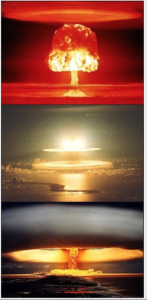
When reading the descriptions in the Puranas,
it is difficult not to think of nuclear weapons.
The disappearance or natural death of the world:
The destruction of the world is implicit in the very fact of Creation, and follows a reverse process in the thought of the Creator. When the force of expansion (tamás) and the force of concentration (sattva) are balanced, the tension (rajas), which is the first cause, the substance of the universe, ceases to exist and the world is diluted into the imperceptible. All vestiges of creation are destroyed, pradhana and purusha become inactive. The earth, the atmosphere and the planetary and extra-planetary worlds, disappear. All that exists is gathered into a single liquid mass, an ocean of fire in which the world dissolves. It is in this immense cosmic ocean that the organising principle, Brahma, sleeps until, at the end of the night, he awakens and, taking the form of a boar [symbol of the spiritual caste of the Brahmins, peoples of the North—Evropa Soberana], raises a new world.
Linga Purana, 1.4, 36-61.
The duration of the universe is expressed by an eighteen-digit number. When the end of time comes, the principle of smell (gandha tanmatra) disappears and, with it, solid matter. Everything becomes liquid. Then the principle of taste (rasa tanmatra) disappears and with it the liquid element. Everything becomes gaseous. Then the principle of touch (sparsha tanmatra) disappears and with it the gaseous element. Everything becomes fire. Then the principle of visibility, the rupa tanmatra (form and light) disappears. When visibility disappears there is nothing left but the vibration of space which disappears in its moment.
Nothing remains but space as a spherical void in which only the vibratory principle exists. This vibration is reabsorbed into the ‘principle of the elements’, i.e. the principle of identification or individuality (ahamkara).
The five elements and the five senses having disappeared, there remains only the principle of individuality (ahamkara) which is part of the expanding force (tamás) which, it too, dissolves into the Great Principle (mahat tattva) which is the principle of consciousness (buddhi).
The plan (purusha), indestructible, omnipresent, which is an emanation of the Self, returns to its source.
—Vishnu Purana, I, chapters 8 and 9.
The play (lila) of the birth and disappearance of the worlds is an act of the power of being, which is beyond substance (pradhana) and plan (purusha), beyond the manifested (vyakta), the unmanifested (avyakta) and time (kala).
The time of being has neither a beginning nor and end. That is why the birth, duration and disappearance of the worlds never stop. After the destruction there is neither day nor night, nor space, nor earth, nor darkness, nor light, nor anything but being beyond the perceptions of the senses or thought.
—Vishnu Purana, I, Chapter 1, 18-23.
The way for a time of unrest
One finds in the Laws of Manu an allusion to the ‘dharma deprived of feet’ (the pada-dharma): a cycle coming to an end when the four feet of the mythical cow, symbolising the four ages of a cycle, have been cut off and the animal can no longer stand upright. During this ‘time of distress’ a certain adaptation is necessary, castes lose their water-tightness and religious duties are lightened. It is this relative ease given to the men of the Kali Yuga that has made the sages of ancient times, like Vyâsa, say that ‘it is easier to attain salvation in this age’. For the Linga Purana ‘merits acquired in one year in the Treta Yuga (the second age) can be acquired in one day in the Kali-Yuga’. Is this a happy consequence of the acceleration of time? Not at all, but rather it is setting in motion a compensating equilibrium which wills that at the end of the cycle, the spirit will give itself more spontaneously from the moment when it has become more difficult for men to attain it. The Law then becomes gentler and less demanding; mercy takes precedence over rigour and grace spreads more generously.
To Arjuna when he questioned Krishna about the fate of the man who doesn’t consider himself at all capable of true ascetic effort, the god replies that such a man is not condemned either in this world or in the next, if he is nevertheless the author of ‘beautiful and good deeds’. In a similar perspective, Shrî Râmakrishna told his disciples that even if they practised only one-sixteenth of his teaching, their salvation would be assured.
Islam, for its part, prefers to evoke the ‘tenth of the law’, corresponding to the last revelation of the present cycle, the ‘seal of prophecy’. This tenth comprises the profession of faith, daily prayers, almsgiving, the annual fast and the pilgrimage to Mecca. On the other hand, it must be considered that these ‘five pillars’ can be subject to different interpretations.
The Christian parable of the eleventh-hour workers had already addressed the issue. Those who have worked one hour in the field (who have put in the minimum spiritual effort) will receive the same wage (a denarius) as those who have worked all day—all their lives, in full heat in ascetic ardour. It is thus, concludes Luke’s Gospel, that the ‘last shall be first’, which, to the short-sighted, will seem fundamentally unjust. Some apothegms of the desert echo the merits of these men of the end of the journey, of whom we can think that we are part.
The Abba Ischiriôn declares to his disciples:
‘The men of this generation will do no (spiritual) work, the temptation will come upon them, and those who are tested at that time will be found greater than us, than our fathers and the fathers of our fathers.’
The end of the Kali Yuga is a particularly favourable period for investigation and search for true wisdom:
The age of Kali, though an abyss of vices, possesses a unique and precious advantage: it is enough to celebrate the praises of Krishna so that, freed from all bonds, one is united with the supreme being. (Bhâgavata Purâna, l, XII, Chapter III, 52).
Some will attain wisdom in a short time because the merits acquired in one year during the Treta Yuga can be attained in one day in the Kali Yuga (Shiva Purâna, 5.1, 40-40).
At the end of the Kali Yuga, the god Shiva [consciousness—Evropa Soberana] will manifest to re-establish the righteous path in a secret and hidden form (Linga Purâna, 1.40.12).
Blessed are the children of the Kali Yuga; as nothing has been given to them, nothing will be demanded of them (from a Tantric text).
Excellent, excellent Kali-Yuga! What in the Silver Age or the Bronze Age cost a long time and toilsome efforts, in the Kali Yuga is accomplished in a day and a night. (Vishnu Purana).
The door that leads to wisdom is opened. Will men have the discernment and the courage to enter through it?

Evropa Soberana’s appendix on Ragnarok: the fate of the world according to the Germanic peoples
First of all, it should be remembered that for the ancients, time was divided into cycles. All Indo-European peoples without exception recognised that the ‘golden age’ was behind them, and that the age in which they lived was one of disintegration and degradation. The Greeks thus conceived of a golden age, a silver age, a bronze age, an ‘age of heroes’ (corresponding to the time of the Trojan War) and finally an iron age. The Romans added, in the beginning, an age of stone and an age of wood.
The very idea of cycles excludes an apocalyptic or ‘end of the world’ idea, since the end of one cycle is only the beginning of the next. In the mentality of our ancestors the first ages were times of justice, harmony, beauty and wisdom, which gradually became corrupted into times of betrayal, conflict, violence, dishonour, forgetfulness of the gods and rites, evil, materialism, miscegenation and being trapped by the ‘dark’ powers that oppose the gods.
For the Germanic people the Age of the Wolf, the last of all ages, would be a time of wars and catastrophes, ending in Ragnarok (‘fate of the gods’, also ‘twilight of the gods’), the ‘breaking of all ties’ (i.e., the annulment of every bond, control, restraint or moral barrier, and the return to primordial chaos), the destruction of the nine worlds, brought about by a last desperate war to the death between the divine powers and the demonic powers. A few gods and men will survive this struggle, and with the ruins of the Iron Age they will build a new golden age.
Let us look at the symbolic language elaborated by the subconscious instinct of the primitive Germanic people to be able to express themselves and thus engrave themselves in the collective Germanic memory. It must be made clear once again that it is symbolic, that each element has a meaning and that it is not to be taken literally, as if it were a simple story. (In the same way, no one interprets a dream literally, but tries to dive into the symbols.) It is telling that the Germanic people, an Indo-European branch at the opposite geographical extreme to the Indo-Aryans, had a concept of the end of the cycle very similar to that of their Eastern cousins.
Ragnarok would be preceded by Fibulwinter, a three-year winter in which many people would die. Fenrir, the wolf representing the forces and instincts fallen out of control, would spread chaos, destruction and evil throughout the world, causing men to become more and more corrupt. Jormugand, the sea serpent (a tail-biting ouroboros, representing matter and time, that which contains the spirit) that circles the earth, would invade it, flooding it with great waves and floods of its venom. Loki, the god of impure blood, the cause of discord and envy, will break his chains and join the creatures of Muspelheim (the place of fire, representing the infrared world and the elemental powers) to fight the gods. The two ‘celestial wolves’, Skoll and Hati (‘Disgust’ and ‘Hate’) who chase the Sun and the Moon across the firmament, will finally catch up with them and devour them.
The world will freeze over, taking many lives. Loki will lead an attack on Asgard, the world of the gods, and at this moment, Valhalla, the hall of the fallen, will open its doors. Valhalla has been filled with the souls of men chosen by the Valkyries who have fallen in battle for righteous causes throughout history. With walls made of golden spears, a roof made of golden shields, and a great living tree as a central pillar (‘axis of the world’), Valhalla had 540 huge gates, through each of which 800 fully armed warriors will go out, side by side: 432,000 men in all. The horn of war sounds across the nine worlds, the Bifrost rainbow bridge (linking the world of gods with the world of men) collapses under the weight of the giants and there takes place, on a plain called Vigrid, the most immense battle ever seen, which will pit the gods against their enemies and which has been written in the destiny of the world since its very creation.
There, Fenrir, who opens his jaws so wide that he destroys everything between heaven and hell, kills Odin, but will in turn be slain by Vidar, a son of Odin who represents silence and vengeance, who is the strongest god after Thor and dwells in the forests. With his hand, he will grab Fenrir’s snout, and by placing his foot on his lower jaw, he will tear his jaw. Loki and Heimdal (the white god, repository of wisdom and progenitor of mankind) will kill each other, as will Garm (the wolf of the underworld, reminiscent of the Greek Can Cerberus) and Tyr (the god of war, order, loyalty and honour). The well-known god Thor—representative of thunder and male fertility, and chief champion of the gods—will kill Jormugand, but will fall dead from his poison after only three steps. Surt, the god of the infernal world, will spread fire throughout the nine worlds; all life will be annihilated and the earth will sink into the sea.
This would mean the end of man and life, and the destruction of the nine worlds; but one human couple, Lif (‘Life’) and Lifthrasir (‘he who wills life’, or ‘desire to live’), will survive by climbing the Ygdrasil tree, the axis of the world. Sheltered in the branches of the great tree, through its leaves they will ‘see how the Sun dies and is born again’. When the battle is over and the storm has subsided, a new land will emerge from the sea, fresh and green, full of life, and the couple will populate it, renewing human civilisation. Among the gods will live Modi (‘Angry’) and Magni (‘Strong’), both sons of Thor. Modi is a god of battle rage, while Magni is supposed to be the strongest being in all of Creation, stronger even than his father. Both will inherit Mjolnir, Thor’s hammer, which represents the celestial lightning and thus the strength of the gods. Baldur, the god of beauty, light and pride, who was killed by Loki and imprisoned in the underworld, will be reborn. Vidar and Vali (a god born expressly to avenge Baldur’s death) will survive. The surviving beings will find a chessboard (‘control over the earthly world’) with golden pieces, and will inherit the regal and lordly role of the old gods, in an era of justice, order and harmony.
The Germans, then, were pessimistic in their conception of the progressive degeneration of mankind, that, when it hits rock bottom, will trigger the awakening of the gods and a world war that will end the present world as we know it. However, optimism is also represented here by the prospect of a new renaissance and a ‘new beginning’: something which, in contrast, doesn’t exist in the Christian tradition, which envisages an apocalypse similar to the one that ended Rome, and a final judgement, without further ado.
How were these ideas forged?
In short, where did those Hindus and Germans get all these ideas from? Because we are talking about very specific ‘predictions’ and, to top it all, much of it is coming true. Moreover, the rest of the Hindu teachings demonstrate an immense knowledge of medicine, sex, ritualism, symbology, asceticism, inner alchemy, anatomy, nutrition, mathematics, etc., getting it right in all these fields and even anticipating modern science. I don’t see why in the case of intuition and the ‘sixth sense’ it should be otherwise.
Today, intellectual instruction is limited to the mechanical memorisation of data, and what is called ‘wisdom’, to which our ancestors attached so much importance, has been abandoned. Today we have scholars, doctors, graduates or jurists of all stripes, most of whom have limited themselves to acting as a ‘hard disk’ for a pile of data from which they are unable to draw connections or practical lessons for human existence and life. They resemble the typical folkloric dragon who, having hoarded a great treasure, is unable to do anything with it except keep it in its place. This contrasts immensely with the times of old, when most of the population was illiterate but instead developed important areas of the brain that had to do with instinct and memory (works such as the Rigveda were memorised by ‘bards’ who had a sacred role, and who were blindfolded so that they would not be distracted in reciting them) and intuition, and thus forged a human type much better prepared for life on Earth.
Among the societies connected to the earth and, therefore, to true human nature—where all bodily and psychological functions functioned perfectly because they live under the conditions for which evolution designed the human being—there stood out, from time immemorial, wise men, great connoisseurs of the human mind, of the body, of ‘magic’ (symbology, rituality) and of Nature, who were in various places druids, priests, shamans, Brahmins, and more; in whom the rest of the people instinctively recognised a link with the celestial, i.e. the world of the spirit; where the ancestors, the fallen in battle and the divine wills that infuse life and spirit into the creatures of the material world, dwelled. These people, it is recognised (for example, the prophecies of the Delphic oracle in Greece were always fulfilled and there is no logical explanation for this), must perforce have been able to place their minds in states from which they could access the knowledge of the future or remote places.
Symbols and archetypes were of paramount importance, since they carry with them a piece of whole baggage of data and knowledge and are capable of arousing certain emotions or feelings in human beings stimulating certain memories or instincts, or literally programming the mind (European mythologies and folklore, including episodes of ‘fairy tales’, are true examples of mental programming, as are, no doubt, the current television pieces from which this new ‘globalised folklore’ we now have is nourished). Symbols, moreover, were an effective way of skipping tedious data and long explanations, and of directly reaching people who were in a position to understand them. It is well-known that a word to the wise is enough. The problem is that generally, today, the conditions in which we live are so far removed from those in which our ancestors were immersed that we are unable to process the symbolic range they handled, since it was designed for people with a psychological horizon dominated by the earth, living creatures and the ‘beyond’, intense physical activity, clan cohesion, courage, fog, cold, snow, folk legends, forests, the importance of the solar cycle, mystery and fascination with a world that is perceived to be entirely alive and full of energy and movement… Whereas we are accustomed to the masses of concrete and glass, the four walls of a room/ discotheque/ school/ high school/ university, to harmful substances that attack human biology, television series, ideas hostile to our mind, aberrant lifestyles. In short, a whole series of factors that alienate us from our original nature that are in contradiction with our mental circuits from the moment we are born, and that distort our memory and our perception of the world.
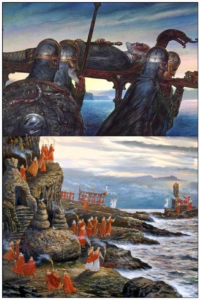
In the times when life was pure and human beings followed the evolutionary programme for which God designed them, the human mind was like an intermediary between the world of spirit (will) and the world of darkness (instincts). The true mysteries of existence were more accessible to it than they are now. Compare this with any ‘modern’ and ‘sophisticated’ everyday scene today (see image below), or with any poor man collapsing on the sofa in front of the TV screen after a sedentary day’s work within four walls, devitalised and with a lousy semen.
In the beginning, wisdom was exclusively oral. It was ancestral, so no one knew where its roots were. Eventually, it was written down. The Hindu Puranas we have seen are part of it; they date back to the Middle Ages, although they were part of a much older tradition, and have been called ‘the fifth Veda’. In Europe, we were less fortunate: Christianity persecuted this wisdom not only at the high levels of initiatory cults, but even at the level of simple country women who knew medicinal herbs or who could see through people. Still, certain traditions have survived and in Iceland, a medieval republic formed by Norwegians and now the world’s oldest democracy, the idea of ‘Ragnarok’, among other things, was written down.
Quite simply, the wise men of the tribes of old had, by genetic predisposition, or by the exercise of their faculties, or by both, attained a super-development of intuition and clairvoyance, which enabled them to access regions of the brain that, in modern man, have long been atrophied by the effect of materialism and sedentary urban life. According to Arthur C. Clarke, ‘magic is only science that we are not yet able to understand’.

The ‘pitiful well-being’, or the ‘satisfied gentleman’ of which Ortega y Gasset spoke, that bourgeois comfort, the mollification of plastic, superficiality and alienation, are some of the causes of modern man’s complete detachment from his true role in the world.
Many people don’t believe in all this. It is not my intention to convince them that there is clairvoyance, the ‘beyond’ and all these matters, but even the most sceptical and materialistic will have to recognise, in any case, that any natural society possessed ‘instinctive’ wisdom which has been lost with the advent of the technological revolution, and that traditional societies are ‘more spiritual’ than modern ones.
__________________
[1] To situate the reader, this is the time when Pharaoh Menes unified Upper and Lower Egypt, the time of Sumerian culture and the origin of the Gilgamesh epic.
[2] The time of the Babylonian Captivity, the reign of Nebuchadnezzar II and the Renewed Covenant.
[3] The year of the outbreak of World War II.
[4] This would loosely coincide with the story of the dream of the Roman emperor Julian the Apostate. According to this legend, the emperor dreamt, before his death, that the Roman eagle (emblem of Zeus-Jupiter, Sun, lightning) flew off to the East and took refuge for two thousand years in the highest mountains of the world. At the end of the two millennia (Julian lived in the 4th century), the eagle would awaken and return to the West carrying a sacred sign on its legs. A good interpretation is that, after the destructions foretold in the scriptures, there will be a long period of emptiness, calm and apparent ‘hibernation’, which will only be broken in the 25th century with the birth of a new cycle.
[5] Some important historical events in May 1939 are the appointment of Molotov as foreign minister of the USSR, the withdrawal of German and Italian troops from Spain, the ‘New Palestine Plan’ approved by the British, or the German-Italian military alliance.
[6] Also called Satya Yuga. In this age the Dharma bull, symbolising order and morality, stood on its four legs, whereas in the Treta Yuga it would stand on only three, in the Dvapara Yuga on two, and in the Kali Yuga on one, which has much to do with the relative length of the cycles of 4, 3, 4, 1, and with the very name of the cycles (treta means ‘three’, and dva, ‘two’). The Hindu scriptures speak of the Krita Yuga as an epoch devoted to meditation and virtue, in which treachery and wickedness are not conceived of. Thus, according to the Mahabharata, in this age all that men needed ‘was obtained by the power of the will’ and there was no sickness, old age, hatred, vanity or sadness; thus speaking of an age in which the human being was perfect.
[7] Interesting mention of what might be considered as the ‘Messiah’ or saviour of spirituality and destroyer of decadence, which fits in quite well with the various traditions, existing in so many peoples, about a great chief or king, who would have died under unclear conditions and who would supposedly be ‘hibernating’ to awaken in a future moment of maximum danger to save his people from destruction. [Editor’s Note: This Justiciar is Kalki, the last incarnation of Shiva in Hindu eschatology.]
[8] Editor’s Note: Watch cosmologist Roger Penrose’s fascinating videos in YouTube.
 When will the inevitable Avenger come—he who will restore order, and put every being in its place? Is it my devotion to him that makes me so fond of all the forces that seem to want to crush this insolent worm that is man? Is he who, in April 1947, made me greet the sight (and the subterranean roar!) of the Hekla in full eruption as one greets the divinities in the temples in India and, in an ecstasy of joy, intone in Bengali the hymn to Shiva: ‘Dancer of Destruction, O King of the Dance’?
When will the inevitable Avenger come—he who will restore order, and put every being in its place? Is it my devotion to him that makes me so fond of all the forces that seem to want to crush this insolent worm that is man? Is he who, in April 1947, made me greet the sight (and the subterranean roar!) of the Hekla in full eruption as one greets the divinities in the temples in India and, in an ecstasy of joy, intone in Bengali the hymn to Shiva: ‘Dancer of Destruction, O King of the Dance’?








